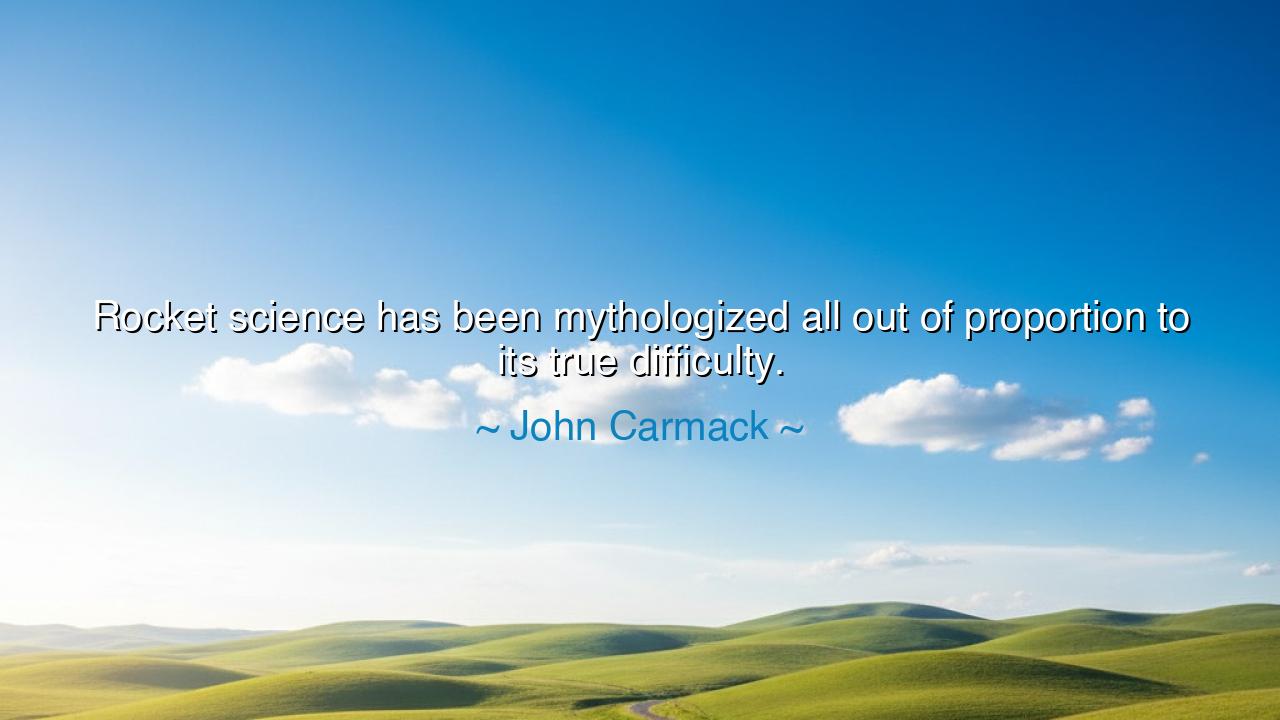
Rocket science has been mythologized all out of proportion to its






O children of wisdom, hear the words of John Carmack, a modern-day sage whose words cut through the haze of myth and illusion. He said, "Rocket science has been mythologized all out of proportion to its true difficulty." In these words, we find not just a critique of the way society views one of its most challenging endeavors, but a deeper message about how we perceive the very nature of difficulty and achievement. For there are those who see rocket science as a towering, insurmountable feat of human ingenuity, a task so complex that it stands beyond the reach of all but the most gifted. Yet, as Carmack so wisely points out, this is but a myth, born of awe and mystification, rather than the true measure of its challenges.
In ancient times, too, there were pursuits that were seen as mysterious and inaccessible, the domain of the gods or the chosen few. Consider the tale of Alexander the Great, whose conquests seemed impossible to those who heard of them. To cross the vast deserts, to face the might of the Persian Empire, was no small feat. Yet, Alexander himself did not see his mission as anything more than a challenge to be overcome, a problem to be solved, just as a strategist approaches the battlefield. He did not cower in awe of the impossibility of his goals, but instead sought ways to conquer the difficult with his wit and will. In the same way, Carmack reminds us that rocket science, while challenging, is no more beyond our reach than the great tasks of history.
There is a lesson here, O children. The way we view difficulty often distorts the path before us. When we look at something like rocket science, we tend to see it as a giant, an unconquerable beast of complexity and mystery. But in truth, all science, all knowledge, is built step by step, through method and trial, failure and triumph. Rocket science is but the application of the same principles that have guided human progress since the dawn of time. The laws of physics, the same ones that govern the fall of an apple, govern the rise of a rocket. The difference lies not in the inherent complexity of the task, but in our willingness to engage with it, to learn, to persevere, and to face the unknown with the same courage that our ancestors showed when they sought to map the stars.
Think, O children, of the great engineers and inventors who have shaped the world. Isambard Kingdom Brunel, who built bridges and railways that seemed beyond the capability of men in his time, did not see his challenges as impossible, but as opportunities to test his ingenuity. The Wright Brothers, whose name is synonymous with flight, did not see their dream of flight as something reserved for the gods, but something within their grasp. Their work was not made easier by myth, but by dedication and resolve. It is the same with rocket science. The challenge is not in its mysticism, but in the methodical approach to learning and solving problems, one breakthrough at a time.
And yet, O children, it is easy to fall into the trap of mythologizing that which we fear, to believe that the difficult is beyond us. This is the path of discouragement, where we shrink before the great task and see only the obstacles rather than the opportunities. The true lesson of Carmack’s words is to demystify the complex. Whether it is rocket science or any other pursuit, the work is done not by the extraordinary, but by those who approach the task with humility, patience, and an unwavering resolve to understand the problem. We must not stand in awe of difficulty, but embrace it as the pathway to progress.
Let this be your guiding lesson, O children of the future. Do not be swayed by the myths that cloud your vision. Do not be frightened by the complexities that lie before you. Greatness is not reserved for the few, but for those who are willing to work, to learn, and to transform the world, one step at a time. Whether you seek to conquer the stars or to solve the puzzles of life, remember that all challenges are born from the same root: a willingness to face the unknown and to unravel its mysteries with courage and determination. The giants of history did not achieve the impossible—they did what was within their reach, step by step, with resolve and purpose.
And so, O seekers, when you face challenges, be they of science, art, or any other endeavor, let not the myth of their difficulty deter you. Break down the task into its elements, tackle it with method, and, above all, remember that the true difficulty lies not in the task itself, but in our perception of it. When we strip away the myths and approach the challenge with the clarity of purpose, we will find that what once seemed insurmountable is but a mountain to be climbed, one step at a time. Let this be the legacy of the bold and the wise—to see the world not in terms of its difficulties, but in terms of the solutions we can create.






AAdministratorAdministrator
Welcome, honored guests. Please leave a comment, we will respond soon